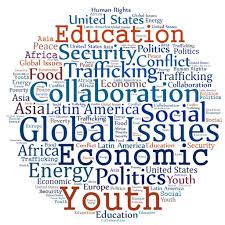International Collaboration: Strengthening Social Service Management through Global Partnerships
This article examines the crucial role of international collaboration in enhancing social service management and achieving global good governance. We will define key concepts and explore how theoretical frameworks can be applied to practical situations, illustrating the benefits of transnational cooperation. Key concepts include global good governance (the effective and accountable exercise of power to meet societal needs), social service management (the efficient and equitable delivery of social services), and capacity building (the development of skills and knowledge to improve performance).
1. Enhancing Global Good Governance through Knowledge Sharing: Effective governance is the bedrock of successful social service systems. Applying principles of New Public Management (NPM), international collaboration facilitates the exchange of best practices in transparency, accountability, and citizen participation. Countries can learn from each other's experiences in implementing e-governance initiatives, utilizing open data platforms, and fostering participatory budgeting processes to improve efficiency and responsiveness. For example, the success of a transparent procurement system in one nation can inform the reform of a less efficient system in another.
2. Optimizing Social Service Delivery through Comparative Analysis: Social service programs aim to address societal challenges. The application of comparative policy analysis allows nations to benchmark their performance, identify areas for improvement, and adapt successful models from other contexts. This process involves analyzing the strengths and weaknesses of different approaches to service delivery, such as welfare state models or community-based initiatives. A comparative study of healthcare systems, for instance, could highlight the effectiveness of different funding mechanisms or healthcare delivery models.
3. Building Capacity through International Exchange Programs: International collaboration is pivotal in developing the expertise of social service professionals. Employing Kolb's Experiential Learning Cycle, training programs, workshops, and exchange visits facilitate knowledge transfer and skill enhancement. These initiatives allow professionals to learn firsthand the nuances of different approaches to social work, policy development, and program evaluation. For example, an exchange program pairing social workers from a developing country with their counterparts in a developed country can lead to significant skill development and knowledge transfer.
4. Fostering Research and Innovation through Collaborative Research: Joint research ventures can tackle complex societal challenges. By applying principles of participatory action research, countries can collaborate on research projects addressing pressing social issues such as poverty, inequality, and climate change. This collaborative approach leverages diverse expertise and resources to produce evidence-based solutions that can inform policy and improve program design. A collaborative project could focus on the impact of climate change on vulnerable communities, leading to the development of effective adaptation strategies.
5. Strengthening Crisis Response through Coordinated Efforts: International cooperation is crucial during crises such as natural disasters or pandemics. Applying principles of disaster management, coordinated responses ensure efficient resource allocation and effective relief efforts. The shared experience of the COVID-19 pandemic demonstrated the power of global collaboration in tackling a worldwide health crisis. Collaborative efforts include the sharing of medical supplies, expertise in epidemiological modeling, and the coordinated rollout of vaccination campaigns.
6. Promoting Cross-Cultural Understanding and Policy Exchange: International partnerships foster mutual understanding and inform policy development. By applying intercultural communication theories, countries can appreciate diverse perspectives and learn from each other's policy approaches. This exchange can lead to the adaptation and implementation of more effective and culturally sensitive policies. For example, a country could adapt a successful model of community-based policing from another country, modifying it to suit its own cultural context.
7. Leveraging Resources and Building Strategic Partnerships: International collaboration expands access to resources and fosters strategic alliances. Applying the principles of network theory, countries can form partnerships to enhance their capacity to address social challenges. This can involve sharing technological advancements, securing funding opportunities, and accessing expertise. A collaborative network could facilitate the development and dissemination of innovative technologies to improve the efficiency of social service delivery.
8. Learning from Successes and Failures: Systematic analysis of both successful and unsuccessful social programs is vital. Using qualitative and quantitative research methods, such as case studies and comparative analysis, countries can learn valuable lessons from others’ experiences, improving future initiatives. Examining the factors contributing to the success or failure of various welfare programs can provide insights into best practices and potential pitfalls.
9. Advocating for Social Justice and Sustainable Development: Collective action amplifies the impact of advocacy efforts. Applying principles of advocacy and lobbying, countries can collaborate to advocate for social justice, human rights, and sustainable development goals. Joint advocacy initiatives can lead to greater influence in shaping global policies and programs.
10. Promoting Inclusivity and Continuous Improvement: International collaboration ensures that the voices of all stakeholders are heard. Through inclusive participatory processes, countries can create social service systems that meet the diverse needs of their populations. A commitment to continuous evaluation and improvement ensures that systems remain relevant and responsive to evolving social needs.
Conclusions and Recommendations
International collaboration is not merely beneficial but essential for effective social service management and good governance. By leveraging comparative policy analysis, fostering capacity building through experiential learning, and building collaborative research networks, nations can significantly enhance their ability to address complex social challenges. Future research should focus on evaluating the impact of specific collaborative initiatives, examining the factors that contribute to successful partnerships, and developing best practices for fostering sustainable international collaborations. These efforts will require a multi-faceted approach involving governmental agencies, non-governmental organizations, academic institutions, and social service professionals. The impact will be far-reaching, leading to improved social outcomes, strengthened governance, and greater global equity.
Reader Pool: Considering the multifaceted benefits outlined, how can we best incentivize and facilitate broader participation in international collaborations aimed at strengthening social service management?
```




No comments yet. Be the first to share your thoughts!